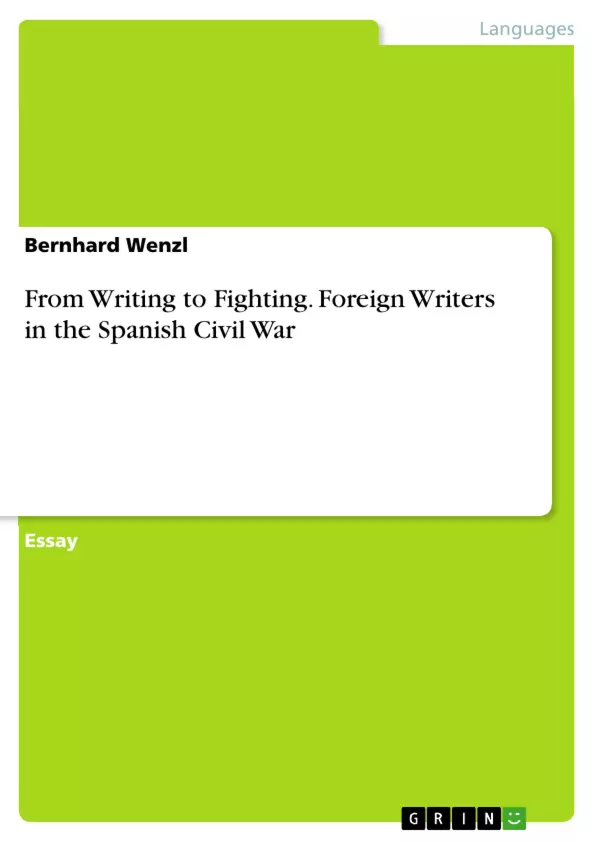The Spanish Civil War has left deep traces on the cultural memory of the anti-fascist movement. One of the reasons is the wealth and breadth of the artistic works produced by supporters of the Spanish Republic during and after the war years. Besides contemporary photographs and films, there are thousands of journalistic and literary documents that keep alive the collective history of the violent attack launched by Franco's Nationalist Army and of the courageous defence organized by the left-wing parties and labour unions in the Republican Government. A considerable amount of these writings came from the pen of foreign authors including George Orwell, Arthur Koestler, André Malraux, and Ernest Hemingway.
Inhaltsverzeichnis (Table of Contents)
- From writing to fighting - the Spanish Civil War turned many foreign writers into anti-fascist fighters
- Writers as war correspondents
- From reporting to fighting
- The Second International Congress of Writers for the Defence of Culture
- The fight against fascism
- Fictionalization as an expression of anti-fascism
- Memories of the Spanish Civil War
Zielsetzung und Themenschwerpunkte (Objectives and Key Themes)
This text examines the role of foreign writers in the Spanish Civil War (1936-1939), exploring their transition from reporting on the conflict to actively fighting for the Republic. It highlights the impact of the war on these writers' creative output and their lasting memories of the experience.
- The role of foreign writers in the Spanish Civil War
- The impact of the war on the creative output of foreign writers
- The transition from reporting to fighting
- The influence of the Spanish Civil War on anti-fascist movements
- The enduring legacy of the war on writers' memories and creative work
Zusammenfassung der Kapitel (Chapter Summaries)
- The first chapter introduces the context of the Spanish Civil War and the role of foreign writers in documenting the conflict. It highlights the importance of their reporting in providing a counter-narrative to the biased coverage of the war in the conservative foreign press.
- The second chapter focuses on the shift from reporting to fighting, as foreign writers felt compelled to actively support the Republic. It describes the formation of the international brigades and the motivations of writers who joined the fight.
- The third chapter examines the Second International Congress of Writers for the Defence of Culture, held in Barcelona in 1937. It discusses the role of writers in promoting anti-fascism and the significance of their collective declaration of solidarity with the Spanish Republic.
- The fourth chapter explores the various ways in which writers expressed their anti-fascist convictions through their creative work, including fictionalization and autobiographical accounts.
- The fifth chapter examines the lasting impact of the Spanish Civil War on writers, focusing on their autobiographical writings and memoirs that reflect their experiences during the war and the aftermath.
Schlüsselwörter (Keywords)
The text focuses on the Spanish Civil War, foreign writers, anti-fascism, war reporting, international brigades, literary responses to war, and the lasting impact of the war on writers' lives and creative work. It also explores themes of political commitment, social justice, and the role of intellectuals in times of conflict.
- Quote paper
- Mag. Bernhard Wenzl (Author), 2016, From Writing to Fighting. Foreign Writers in the Spanish Civil War, Munich, GRIN Verlag, https://www.grin.com/document/351358



